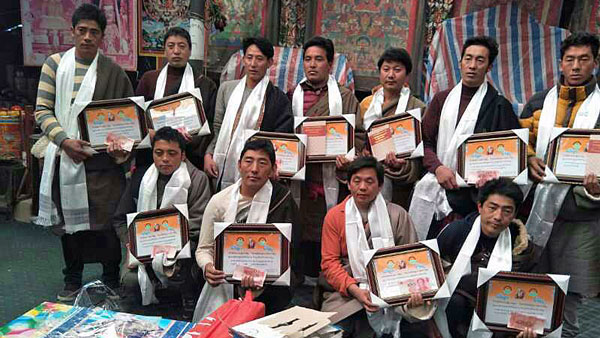'Unofficial' Tibetan language summit draws hundreds of advocates in China's Qinghai
| Publisher | Radio Free Asia |
| Publication Date | 26 January 2018 |
| Cite as | Radio Free Asia, 'Unofficial' Tibetan language summit draws hundreds of advocates in China's Qinghai, 26 January 2018, available at: https://www.refworld.org/docid/5a942853a.html [accessed 4 November 2019] |
| Disclaimer | This is not a UNHCR publication. UNHCR is not responsible for, nor does it necessarily endorse, its content. Any views expressed are solely those of the author or publisher and do not necessarily reflect those of UNHCR, the United Nations or its Member States. |
2018-01-26
 Winners of a Tibetan language competition display certificates awarded to them at a conference at Tashi Cheoling Monastery in Chigdril county, Golog Tibetan Autonomous Prefecture, in northwest China's Qinghai province, Jan. 25, 2018. Photo courtesy of an RFA listener
Winners of a Tibetan language competition display certificates awarded to them at a conference at Tashi Cheoling Monastery in Chigdril county, Golog Tibetan Autonomous Prefecture, in northwest China's Qinghai province, Jan. 25, 2018. Photo courtesy of an RFA listener
Hundreds of Tibetan language advocates from three provinces in China attended a conference on the Tibetan language and modern terminology on Thursday in a further bid by members of the minority group to protect their culture, a source from Tibet said.
The "unofficial" conference, whose organizers did not seek permission for the event from Chinese authorities, was held at the Jonang sect of the Tashi Choeling Monastery in Chigdril (in Chinese, Jiuzhi) county, Golog (Guoluo) Tibetan Autonomous Prefecture in northwest China's Qinghai province, said the source who declined to be named.
"Lay Tibetan men and women who took part in this Tibetan language conclave ranged in age from seven to 60 years," he told RFA's Tibetan Service.
"Particularly at this literary event, representatives from many Tibetan language associations that have sprung up voluntarily to promote Tibetan language in the past years also attended the gathering," he said.
Language rights have become a particular focus for Tibetan efforts to assert national identity in recent years, with informally organized language courses typically deemed "illegal associations" and teachers subject to detention and arrest, sources say.
"Through the efforts of such grassroots language associations, many Tibetans have become literate through the help of volunteer teachers," said the source, adding that the instructors spend hours proving lessons on social media platform WeChat.
Conference organizers also held competitions testing the memorization and usage proficiency of newly coined Tibetan terms listed in Tibetan encyclopedias, as well as competency in the everyday use of the language and phraseology, including new science and technology words, the source said. Awards were handed out to the winners.
The language summit also featured scored Tibetan conversation and language competency competitions for which winners were given prizes, he said.
"The participants of this language conclave had frank and meaningful exchanges on the merits of continuing to advocate for Tibetan language literacy skills among the Tibetan community," he said. "They also explored ways to further improve their mission of promoting the Tibetan mother tongue in the future."
There was a consensus among language advocates at the conference to end the use of a mixed language of Tibetan and Chinese in various Tibetan communities, because is it seen as diluting and undermining the standard Tibetan, the source said.
Advocates for greater Tibetan cultural rights have been pressing Chinese government officials for wider use of the Tibetan language in schools in Tibetan-populated regions of China, though several have been jailed for their activities.
Earlier this month, authorities in Qinghai's Yulshul (Yushu) Tibetan Autonomous Prefecture prosecuted Tibetan shopkeeper and language activist Tashi Wangchuk on charges of "inciting separatism" for his efforts to preserve and promote the use of his native language. He faces a possible 15-year prison term when the court reads its verdict at a later date.
Writers, singers, and artists promoting Tibetan national identity and culture have frequently been detained by Chinese authorities, with many handed long jail terms, following region-wide protests against Chinese rule that swept Tibetan areas of China in 2008.
Reported by Kunsang Tenzin for RFA's Tibetan Service. Translated by Dorjee Damdul. Written in English by Roseanne Gerin.
Link to original story on RFA website
